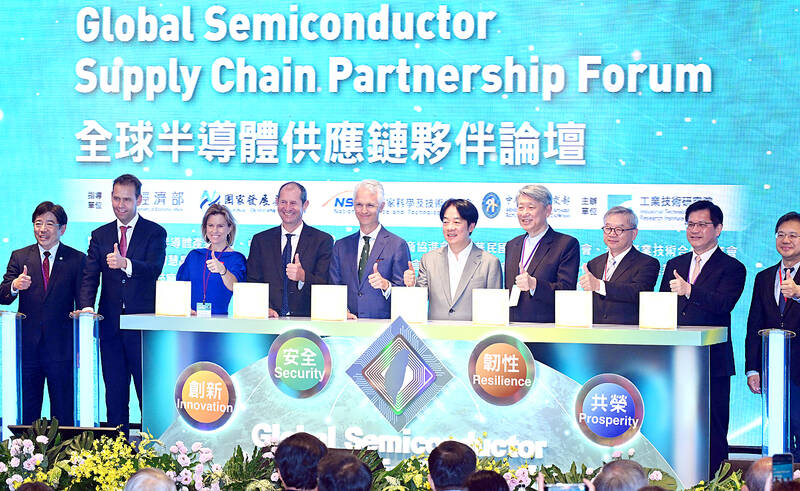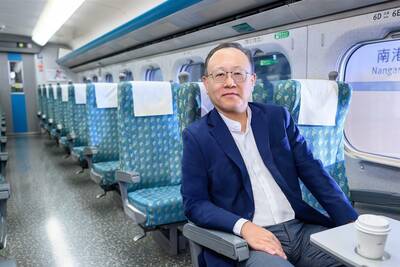Taiwan welcomes increased cooperation with the US in semiconductor manufacturing and artificial intelligence (AI), Minister of Foreign Affairs Lin Chia-lung (林佳龍) said yesterday.
Lin made the comment on Facebook a day after the Global Semiconductor Supply Chain Partnership Forum at Computex in Taipei, with the forum attended by 700 representatives of industry and the diplomatic missions of Japan, the US, the UK and the Netherlands.
The Ministry of Foreign Affairs, the Ministry of Economic Affairs, the National Development Council and the National Science and Technology Council (NSTC) jointly planned the forum, which revolved around the theme of innovation, security, resilience and shared prosperity, Lin said.

Photo: Liao Chen-huei, Taipei Times
President William Lai (賴清德) told the event that AI technology would become deeply ingrained in every aspect of human life and Taiwan aims to take a pivotal role in its development, Lin said.
Taiwan’s chip manufacturing depends on global collaboration and the government needs to work with businesses to pave the way for the rise of the AI sector, Lin quoted Lai as saying.
The success of Computex — which drew 50,000 participants from Tuesday to Friday — is a testament to Taiwan’s strategic value to the world’s chipmaking industry, Lin said.
US semiconductor design, Japanese manufacturing of key materials and Dutch lithography technology each play an indispensable role in the global collaborative chipmaking enterprise, he said.
Nvidia Corp’s planned Global Taiwan Headquarters, Taiwan Semiconductor Manufacturing Co, Hon Hai Precision Industry Co and the NSTC are to cooperate to make supercomputers for AI research, he said.
The group is to work with Wistron Corp and Siliconware Precision Industries Co to build supercomputers in the US, he said.
Taiwan welcomes US investments and the deepening of bilateral cooperation in AI-related technology and global economic links, he said, adding that Taiwan would continue to promote partnerships with all nations in the AI industry to contribute to global growth.

The inspection equipment and data transmission system for new robotic dogs that Taipei is planning to use for sidewalk patrols were developed by a Taiwanese company, the city’s New Construction Office said today, dismissing concerns that the China-made robots could pose a security risk. The city is bringing in smart robotic dogs to help with sidewalk inspections, Taipei Deputy Mayor Lee Ssu-chuan (李四川) said on Facebook. Equipped with a panoramic surveillance system, the robots would be able to automatically flag problems and easily navigate narrow sidewalks, making inspections faster and more accurate, Lee said. By collecting more accurate data, they would help Taipei

STATS: Taiwan’s average life expectancy of 80.77 years was lower than that of Japan, Singapore and South Korea, but higher than in China, Malaysia and Indonesia Taiwan’s average life expectancy last year increased to 80.77 years, but was still not back to its pre-COVID-19 pandemic peak of 81.32 years in 2020, the Ministry of the Interior said yesterday. The average life expectancy last year increased the 0.54 years from 2023, the ministry said in a statement. For men and women, the average life expectancy last year was 77.42 years and 84.30 years respectively, up 0.48 years and 0.56 years from the previous year. Taiwan’s average life expectancy peaked at 81.32 years in 2020, as the nation was relatively unaffected by the pandemic that year. The metric

TAKING STOCK: The USMC is rebuilding a once-abandoned airfield in Palau to support large-scale ground operations as China’s missile range grows, Naval News reported The US Marine Corps (USMC) is considering new sites for stockpiling equipment in the West Pacific to harden military supply chains and enhance mobility across the Indo-Pacific region, US-based Naval News reported on Saturday. The proposed sites in Palau — one of Taiwan’s diplomatic allies — and Australia would enable a “rapid standup of stored equipment within a year” of the program’s approval, the report said, citing documents published by the USMC last month. In Palau, the service is rebuilding a formerly abandoned World War II-era airfield and establishing ancillary structures to support large-scale ground operations “as China’s missile range and magazine

Passengers on Taiwan High Speed Rail (THSR) will be required to use headphones and make phone calls in gangways under new “quiet travel” rules starting Sept. 22. THSR Chairman Shih Che (史哲) told media that THSR will run a three-month promotional campaign to ensure widespread adoption of the new rules. Those repeatedly ignoring the guidance face the potential termination of their transport contract, which can result in them getting escorted off the train, according to THSR. Shih shared his hope to cultivate an environment conducive to rest and reading for the train’s passengers, stating that these changes aim to “promote self-discipline” among passengers